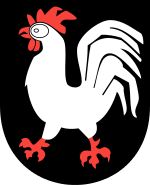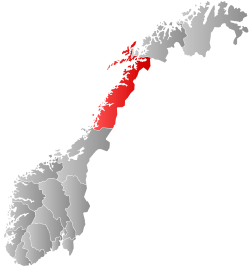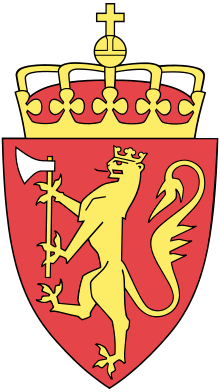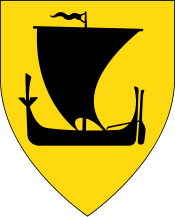Vefsn
| Vefsn kommune | |||
|---|---|---|---|
| Municipality | |||
 | |||
| |||
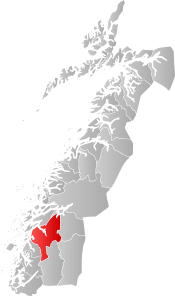 Vefsn within Nordland | |||
| Coordinates: 65°47′57″N 13°15′02″E / 65.79917°N 13.25056°ECoordinates: 65°47′57″N 13°15′02″E / 65.79917°N 13.25056°E | |||
| Country | Norway | ||
| County | Nordland | ||
| District | Helgeland | ||
| Established | 1838 | ||
| Administrative centre | Mosjøen | ||
| Government | |||
| • Mayor (2001) | Jann-Arne Løvdahl (Ap) | ||
| Area | |||
| • Total | 1,929.10 km2 (744.83 sq mi) | ||
| • Land | 1,838.96 km2 (710.03 sq mi) | ||
| • Water | 90.14 km2 (34.80 sq mi) | ||
| Area rank | #33 in Norway | ||
| Population (2017) | |||
| • Total | 13,465 | ||
| • Rank | #88 in Norway | ||
| • Density | 7.3/km2 (19/sq mi) | ||
| • Change (10 years) | -0.8% | ||
| Demonym(s) | Vefsning[1] | ||
| Time zone | UTC+01:00 (CET) | ||
| • Summer (DST) | UTC+02:00 (CEST) | ||
| ISO 3166 code | NO-1824 | ||
| Official language form | Neutral | ||
| Website |
vefsn | ||
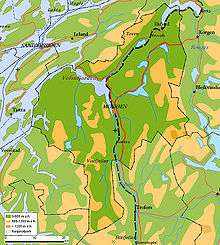
Vefsn (Southern Sami: Vaapste) is a municipality in Nordland county, Norway. It is part of the Helgeland traditional region. The administrative centre of the municipality is the town of Mosjøen (population: 9,631). Other villages include Drevvassbygda, Elsfjord, and Husvik.
The 1,929-square-kilometre (745 sq mi) municipality is the 33rd largest by area out of the 422 municipalities in Norway. Vefsn is the 88th most populous municipality in Norway with a population of 13,465. The municipality's population density is 7.3 inhabitants per square kilometre (19/sq mi) and its population has decreased by 0.8% over the last decade.[2]
History
The municipality of Vefsn was established on 1 January 1838 (see formannskapsdistrikt). In 1862, the eastern district (population: 921) was separated from Vefsn to become the new municipality of Hattfjelldal. This left Vefsn with 5,051 residents. In 1876, the town of Mosjøen (population: 379) was separated from Vefsn to become a separate municipality.
In 1927, the northern district was separated from Vefsn to become the new municipality of Drevja and the southern district was separated to become the new municipality of Grane. After the separations, Vefsn had 3,119 residents remaining. In 1939, a small area of Vefsn (population: 45) was transferred to Mosjøen.
On 1 January 1962, the town of Mosjøen and the municipalities of Drevja, Elsfjord, and Vefsn were merged to form a new, larger municipality of Vefsn. On 1 January 1995, the mainland areas of Alstahaug (population: 70) were transferred to Vefsn.[3]
Name

The municipality is named after the river Vefsna which flows through the municipality into the Vefsnfjorden. The meaning of the river name is unknown. Historically, the spelling has varied from Vefsen to Væffsn.[4]
Coat-of-arms
The coat-of-arms is from modern times; they were granted on 13 September 1974. They show a gray and red rooster on a black background. The rooster is a symbol for watchfulness and alertness. It was adopted by the municipality of Mosjøen on 25 March 1960. After the merger with Vefsn, Drevja, and Elsfjord in 1962, the new name of the municipality became Vefsn and the old arms of Mosjøen were chosen for the new municipality. Since the arms officially became obsolete after the merger, they were re-granted in 1974.[5]
Churches
The Church of Norway has three parishes (sokn) within the municipality of Vefsn. It is part of the Indre Helgeland prosti (deanery) in the Diocese of Sør-Hålogaland.
| Parish (Sokn) | Church Name | Location of the Church | Year Built |
|---|---|---|---|
| Dolstad | Dolstad Church | Mosjøen | 1735 |
| Drevja | Drevja Church | Drevja | 1883 |
| Elsfjord | Elsfjord Church | Elsfjord | 1955 |
Geography
The administrative centre of Vefsn is the town of Mosjøen which is situated along the innermost part of the Vefsnfjorden. Outside Mosjøen, the large municipality of Vefsn is dominated by spruce forests, mountains, lakes, agriculture, and the Vefsna river. The municipality is served by Mosjøen Airport, Kjærstad.
The mountain Lukttinden is located in the northern part of the municipality. There are many large lakes in Vefsn including Drevvatnet, Finnknevatnet, Fustvatnet, Hundålvatnet, Luktvatnet, Mjåvatnet, and Ømmervatnet. The Lomsdal–Visten National Park is partially located in Vefsn.
Birdlife
The bird watcher that visits Vefsn soon realizes that it will take more than a day to cover all the interesting habitats and birding areas. Here you will find areas of virtually untouched coniferous woodlands, both inland and along the coast. The Skjørlegda nature reserve is a good example of woodland protection. Here you will find a virtually untouched coniferous forest covering the Eiterå valley. The valley stretches inland to a higher mountainous habitat that is also worth checking.
Government
All municipalities in Norway, including Vefsn, are responsible for primary education (through 10th grade), outpatient health services, senior citizen services, unemployment and other social services, zoning, economic development, and municipal roads. The municipality is governed by a municipal council of elected representatives, which in turn elect a mayor.
Municipal council
The municipal council (Kommunestyre) of Vefsn is made up of 29 representatives that are elected to four year terms. Currently, the party breakdown is as follows:[6]
| Party Name | Name in Norwegian | Number of representatives | |
|---|---|---|---|
| Labour Party | Arbeiderpartiet | 10 | |
| Progress Party | Fremskrittspartiet | 2 | |
| Conservative Party | Høyre | 5 | |
| Red Party | Rødt | 4 | |
| Centre Party | Senterpartiet | 2 | |
| Socialist Left Party | Sosialistisk Venstreparti | 1 | |
| Liberal Party | Venstre | 2 | |
| Local Lists | Lokale lister | 3 | |
| Total number of members: | 29 | ||
See also
References
- ↑ "Navn på steder og personer: Innbyggjarnamn" (in Norwegian). Språkrådet. Retrieved 2015-12-01.
- ↑ Statistisk sentralbyrå (2017). "Table: 06913: Population 1 January and population changes during the calendar year (M)" (in Norwegian). Retrieved 2017-09-09.
- ↑ Jukvam, Dag (1999). "Historisk oversikt over endringer i kommune- og fylkesinndelingen" (PDF) (in Norwegian). Statistisk sentralbyrå.
- ↑ Rygh, Oluf (1905). Norske gaardnavne: Nordlands amt (in Norwegian) (16 ed.). Kristiania, Norge: W. C. Fabritius & sønners bogtrikkeri. p. 64.
- ↑ Norske Kommunevåpen (1990). "Nye kommunevåbener i Norden". Retrieved 2008-11-30.
- ↑ "Table: 04813: Members of the local councils, by party/electoral list at the Municipal Council election (M)" (in Norwegian). Statistics Norway. 2015.
External links
| Wikimedia Commons has media related to Vefsn. |

- Municipal fact sheet from Statistics Norway (in Norwegian)
- Local history and genealogy (in Norwegian)
- Andås nature reserve with mixed forest (in Norwegian)
- Skjørlægda nature reserve preserving an intact valley ecosystem (in Norwegian)
